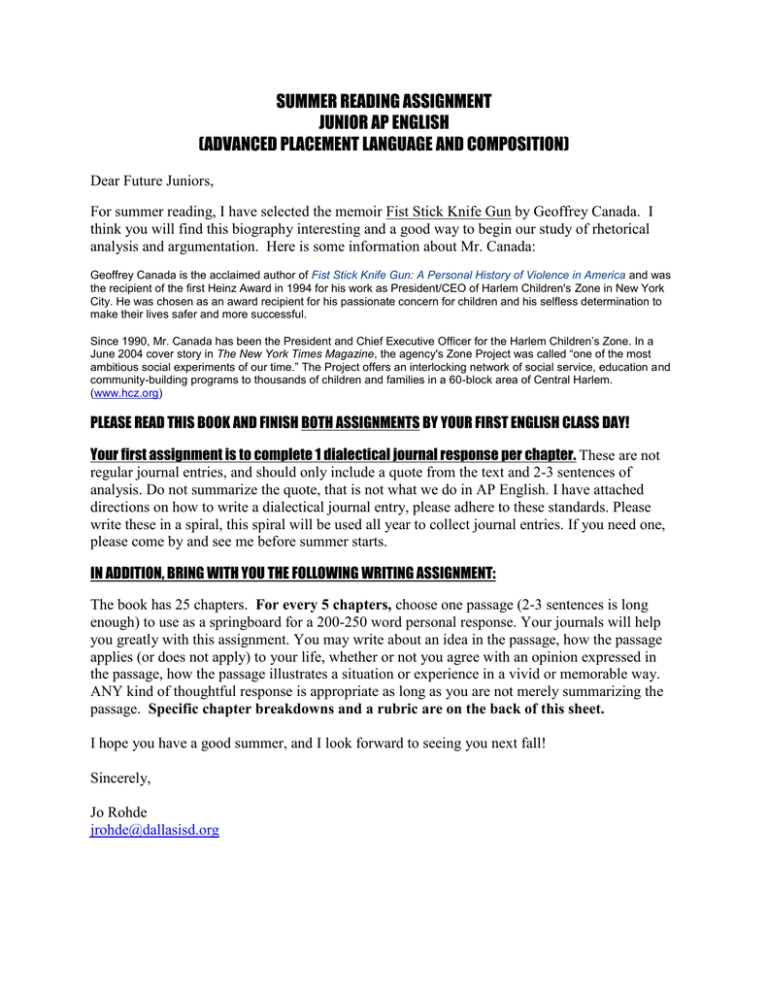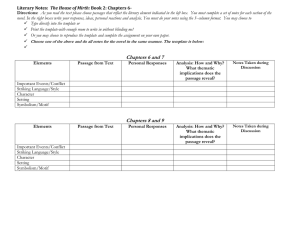summer reading assignment
advertisement

SUMMER READING ASSIGNMENT JUNIOR AP ENGLISH (ADVANCED PLACEMENT LANGUAGE AND COMPOSITION) Dear Future Juniors, For summer reading, I have selected the memoir Fist Stick Knife Gun by Geoffrey Canada. I think you will find this biography interesting and a good way to begin our study of rhetorical analysis and argumentation. Here is some information about Mr. Canada: Geoffrey Canada is the acclaimed author of Fist Stick Knife Gun: A Personal History of Violence in America and was the recipient of the first Heinz Award in 1994 for his work as President/CEO of Harlem Children's Zone in New York City. He was chosen as an award recipient for his passionate concern for children and his selfless determination to make their lives safer and more successful. Since 1990, Mr. Canada has been the President and Chief Executive Officer for the Harlem Children’s Zone. In a June 2004 cover story in The New York Times Magazine, the agency's Zone Project was called “one of the most ambitious social experiments of our time.” The Project offers an interlocking network of social service, education and community-building programs to thousands of children and families in a 60-block area of Central Harlem. (www.hcz.org) PLEASE READ THIS BOOK AND FINISH BOTH ASSIGNMENTS BY YOUR FIRST ENGLISH CLASS DAY! Your first assignment is to complete 1 dialectical journal response per chapter. These are not regular journal entries, and should only include a quote from the text and 2-3 sentences of analysis. Do not summarize the quote, that is not what we do in AP English. I have attached directions on how to write a dialectical journal entry, please adhere to these standards. Please write these in a spiral, this spiral will be used all year to collect journal entries. If you need one, please come by and see me before summer starts. IN ADDITION, BRING WITH YOU THE FOLLOWING WRITING ASSIGNMENT: The book has 25 chapters. For every 5 chapters, choose one passage (2-3 sentences is long enough) to use as a springboard for a 200-250 word personal response. Your journals will help you greatly with this assignment. You may write about an idea in the passage, how the passage applies (or does not apply) to your life, whether or not you agree with an opinion expressed in the passage, how the passage illustrates a situation or experience in a vivid or memorable way. ANY kind of thoughtful response is appropriate as long as you are not merely summarizing the passage. Specific chapter breakdowns and a rubric are on the back of this sheet. I hope you have a good summer, and I look forward to seeing you next fall! Sincerely, Jo Rohde jrohde@dallasisd.org Chapter Breakdown: Chapters 1-5 Chapters 6-10 Chapters 11-15 Chapters 16-20 Chapters 21-25 Passage #1 Passage #2 Passage #3 Passage #4 Passage #5 RUBRIC: ___ Each of 5 responses chosen from chapters as designated above ___ Passage written at top of each response with appropriate citation (Chapter, page #) ___ Each response is from 200-250 words ___ Response demonstrates original insight and voice ___ Student’s personal response to passage is clearly explained ___ Writing demonstrates complex thinking ___ Writing is neat and free of mechanical errors And tonight, some child will go to bed, No food, no place to lay her head. So you and I we must succeed In this crusade, this holy deed, To say to the children in this land: Have hope. We’re here. We take a stand! (from a poem by Geoffrey Canada, 1996)


